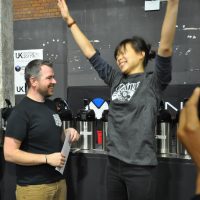 It’s well established that I’m not a huge fan of watching coffee competitions. The exception is the Cup Tasters Championship, a head-to-head competition where there’s no subjectivity and no judging: the participants are either right or wrong. The first time I saw it, I was surprised by the intensity and tension and have been hooked ever since.
It’s well established that I’m not a huge fan of watching coffee competitions. The exception is the Cup Tasters Championship, a head-to-head competition where there’s no subjectivity and no judging: the participants are either right or wrong. The first time I saw it, I was surprised by the intensity and tension and have been hooked ever since.
For the last three years, I’ve watched the UK Cup Tasters Championship at the Manchester Coffee Festival. Rather than repeat myself each time I write up the Championship, I’ve decided to create this page, which explains the competition.
The set-up of the Cup Tasters Championship is simple. There are three bowls of coffee, two of which are the same, with one being (subtly) different. The competitors have to select the odd one out. Get it right, get a point. What I like about it is that there’s nothing subjective or interpretive about it.
Three competitors at a time go head-to-head, each faced with eight groups of bowls. How they approach the task is up to them, but all they have to do (it sounds so simple) is decide which is the odd one out. Once a competitor has chosen the odd one out, the bowl is placed beyond a blue line (and, once moved across the line, can’t be changed). When all eight bowls have been moved beyond the line, that competitor has finished and the time is recorded.
Once all three competitors have finished, it’s time for the scoring. A competitor raises their chosen bowl and the judge checks the bottom of the bowl. A thumbs up means that it’s the odd one out, while a thumbs down means that the competitor has got it wrong. Then it’s onto the next competitor as the scores build up. Will anyone get a perfect eight out of eight? There’s real tension here, with each success greeted by cheers from the crowd.
The Cup Tasters Championship is organised into a series of rounds, with the top competitors going through to the next round. Note that it’s not the winners of the individual heats who go through, but those with the overall best scores in that round. So it’s perfectly possible to win your heat with a low score and fail to make it to the next round, while it’s just as possible to come second, or even third, with a good score, and stay in the competition.
Generally, 21 people qualify for the second round, with the top nine going on to the semi-finals, which then whittles them down to the top three for the head-to-head final. Interestingly, scores in the previous rounds play no part in the subsequent rounds. It’s perfectly possible (and usually happens to someone each year) to score a perfect eight-out-of-eight in one round and crash out of the competition in the next round.
The Cup Tasters Championship has, rightly in my opinion, been described as the simplest of all competitions to enter: all you need is a spoon! The competitors use this to slurp the coffee, a technique I’ve never mastered. This spreads the coffee around the mouth, aiding the ability to detect the subtle differences in taste.
While everyone has different techniques and approaches, the basics are the same. First slurp the coffee, taste it, then spit it out (otherwise competitors would end up seriously over-caffeinated). Usually, as the first mouthful is being spat out, the spoon is being filled with the next sample, since speed is important. While the winner is the one who gets the most right, in a tie, whoever finished quickest, wins. This can be very important in the early rounds, with the cut-off usually decided on time, while in the final, it can lead to some interesting strategy.
So now you know what’s what, you can find write-ups of the individual championships that I’ve witnessed, starting in 2015:
